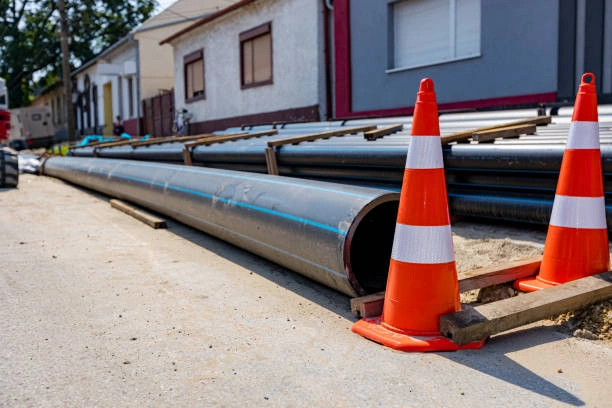Introduction
HDPE (High-Density Polyethylene) material has revolutionized modern piping systems with its exceptional durability, flexibility, and chemical resistance. Unlike traditional materials like metal or concrete, HDPE material ensures long-lasting performance with minimal maintenance, making it the preferred choice for water supply, gas distribution, and industrial applications.
This article explores why HDPE material is the cornerstone of pipe longevity, its unique properties, and how it outperforms conventional alternatives.
What Makes HDPE Material So Durable?
1. Superior Chemical Resistance
- HDPE material resists corrosion, acids, alkalis, and other harsh chemicals.
- Unlike metal pipes, it doesn’t rust or degrade in aggressive environments.
2. High Impact Strength
- Remains flexible even in freezing temperatures (-40°C).
- Withstands ground movement and seismic activity without cracking.
3. Leak-Proof Joints (Heat Fusion Welding)
- Unlike glued or threaded connections, fused HDPE materials creates monolithic, permanent joints.
- Eliminates leakage risks common in traditional piping systems.
4. Abrasion & Wear Resistance
- Ideal for slurry transport and mining applications.
- Maintains smooth interior surfaces, preventing buildup over time.
5. UV & Weather Resistance
- Black HDPE material contains carbon black for UV protection.
- Performs well in extreme outdoor conditions.
HDPE vs. Traditional Pipe Materials
Metal Pipes (Steel, Iron, Copper)
- Prone to corrosion, scaling, and rust → Frequent repairs needed.
- Heavy and rigid → Difficult installation, higher labor costs.
- Limited lifespan (20-30 years) → Requires replacement sooner.
PVC Pipes
- Brittle in cold temperatures → Cracks under stress.
- Uses chemical solvents for joints → Potential leak points.
- Lower pressure resistance → Not ideal for high-demand systems.
Concrete Pipes
- Bulky and fragile → Difficult to transport and install.
- Susceptible to cracking → Ground shifts cause damage.
- Shorter lifespan (30-50 years) → Degrades faster than HDPE.
Why HDPE Materials Extends Pipe Lifespan?
1. 50+ Year Service Life
- HDPE material maintains structural integrity for decades.
- Reduces replacement costs and system downtime.
2. Minimal Maintenance
- No internal scaling or corrosion → Consistent water flow.
- Resists biofilm and bacterial growth → Cleaner water supply.
3. Cost-Effective Long-Term Solution
- Lower installation costs (lightweight, flexible).
- Fewer repairs → Saves money over time.
4. Sustainable & Recyclable
- Requires less energy to manufacture than metal pipes.
- Can be recycled into new HDPE products.

Applications Where HDPE Materials Excels
✅ Water & Wastewater Systems (leak-free, corrosion-proof)
✅ Gas Distribution (safe, durable, and flexible)
✅ Mining & Industrial Pipelines (abrasion-resistant)
✅ Agricultural Irrigation (UV-stabilized, long-lasting)
✅ Marine & Offshore Use (saltwater-resistant)
Conclusion
HDPE materials sets the gold standard for pipe longevity, outperforming traditional materials in durability, cost-efficiency, and environmental impact. Its resistance to corrosion, flexibility, and leak-proof fusion joints make it the ideal choice for modern infrastructure projects.
Whether for municipal water systems, industrial applications, or gas distribution, HDPE materials ensures reliable performance for 50+ years.
FAQs About HDPE Material
1. Does HDPE material degrade over time?
No, HDPE material resists environmental stress cracking and maintains strength for decades.
2. Can HDPE pipes handle hot liquids?
Yes, but optimal performance ranges from -40°C to 60°C. For higher temps, consult manufacturer specs.
3. Is HDPE material eco-friendly?
Yes! It’s recyclable, non-toxic, and requires less energy to produce than metal pipes.
4. Why is HDPE better than PVC?
HDPE offers better impact resistance, flexibility, and leak-proof joints compared to brittle PVC.
5. How are HDPE pipes joined?
Most use heat fusion welding (butt or electrofusion) for permanent, leak-free connections.













![PE Pipe Market Size, Share, Trend [2024-2032] Forecast Report PE pipe](https://pipefittingblog.com/wp-content/uploads/2024/10/bd6eee761609250b2b9f3b286372274c.webp)




